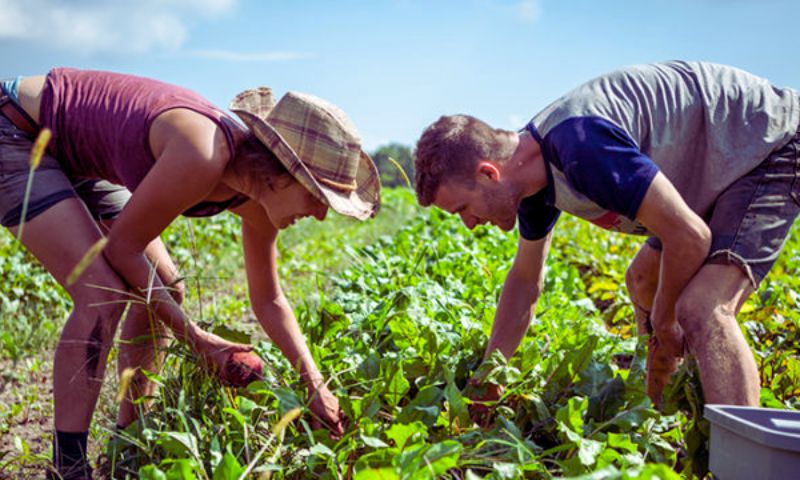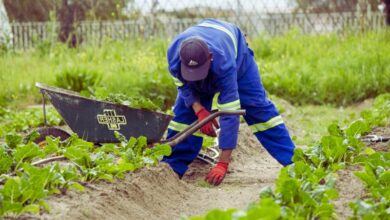Exploring Farm Jobs in Canada: Work which is Meaningful with Opportunities and Purpose

Farming jobs in Canada offer a wide range of opportunities, from short-term seasonal work to stable, long-term positions. As a vital and fast-growing part of the national economy, the agriculture sector provides diverse roles in crop production, greenhouse operations, and livestock care. Programs such as the Seasonal Agricultural Worker Program also give temporary foreign workers a valuable chance to gain hands-on experience and build a better future.
Working on a Canadian farm is more than just employment. It’s a chance to be part of something essential. Behind every harvested fruit, greenhouse-grown tomato, or well-fed herd is someone playing a key role in keeping the country’s food system strong. With breathtaking landscapes and a deep sense of purpose, farming in Canada offers not just work, but a rewarding way of life.
Why Consider a Farming Job in Canada?
Are you looking for work that is reliable, meaningful and offers long-term potential? Canada’s farming sector might be exactly what you need. With growing demand, strong government support, and competitive pay, farming jobs in Canada offer both local and international workers a solid foundation to build a better future. Listed below are a few reasons why you may choose to become a farmer in Canada.
1. Strong Demand
Canada’s agriculture industry contributes over $140 billion annually to the economy, yet it continues to face a significant labor shortage. An aging workforce and declining interest from younger Canadians have opened thousands of job opportunities especially during peak harvest months from May to October.
Whether you’re harvesting crops by hand or operating modern farm equipment, there are roles for all skill levels. The high demand means plenty of chances for consistent work.
2. Government-Support for Foreign Workers
Canada actively supports international workers in agriculture through several immigration and labor programs:
- Temporary Foreign Worker Program (TFWP): Allows employers to fill labor gaps by hiring international workers when no Canadians are available.
- Seasonal Agricultural Worker Program (SAWP): Facilitates seasonal labor from partner countries like Mexico and several Caribbean nations.
- Agri-Food Pilot Program: Offers a route to permanent residency for foreign workers in designated farm-related jobs.
These programs not only offer legal and financial protection but often include employer-provided housing, transportation, and visa assistance.
3. Competitive Wages and Perks
While farm work can be physically challenging, the compensation often makes it worthwhile. Many farming jobs come with benefits and stability that aren’t common in other entry-level roles.
Also Check:
What You Can Expect:
- Hourly pay between $15–$25 CAD
- Overtime pay beyond 40–50 hours/week
- Free or low-cost housing
- End-of-season bonuses for top performance
- Free safety and skills training
Plus, workers who perform well may be invited back each season or offered full-time positions making it a great option for those seeking job stability.
Types of Farm Jobs in Canada
Canada’s farming industry offers many types of jobs, depending on your skills and interests. Here are some of the most common roles:
General Farm Workers
These workers help with many different farm tasks, like preparing the soil, planting seeds, watering and fertilizing crops, and harvesting. They may also fix equipment and sometimes help care for animals.
Livestock Workers
These jobs focus on taking care of animals like cows, chickens, pigs, or sheep. Duties may include feeding, cleaning, and monitoring the animals’ health. This type of work is good for people who are comfortable around animals and have early morning schedules.
Harvesting Workers
Harvesters work in the fields picking fruits and vegetables, sorting them, and packing them for sale or transport. This is usually seasonal work, especially during harvest months. These need to be people who enjoy working outdoors and do not mind physical labor.
Farm Supervisors & Service Contractors
These workers manage farm operations. They may plan daily tasks, supervise other workers, and help with hiring and training. They often have more experience or leadership responsibilities.
Equipment Operators & Maintenance Workers
They are technically skilled individuals or mechanics who operate tractors, combines, irrigation systems, and drones used for smart farming. Requirements for this job include
- A valid driver’s license
- Prior mechanical or equipment experience
- Ability to read technical instructions
Other Related Jobs
There are also farm-related jobs in food processing plants, seafood and fish plants, and packaging facilities. These support the farm-to-table process and offer steady work in rural and coastal areas.
Also Check:
Top Provinces Hiring Farm Workers
British Columbia
If you are looking for jobs that include tasks such as fruit picking, pruning, packing and irrigation work, British Columbia is your best option. Also known as the FRUIT BASKET OF CANADA it is an important region for Canada’s wine production, the province hires thousands of seasonal workers each summer to work in orchards Kelowna, Penticton, and the Okanagan Valley.
Alberta
Alberta that has some of the largest cattle ranches and grain farms, also hires skilled farm technicians and heavy equipment operators for large-scale operations.
Ontario
Ontario’s greenhouse industry is booming, especially in Leamington and Niagara. With many operations running year-round, this is a top destination for long-term roles.
Saskatchewan & Manitoba
This is a good place for those who are interested in grain farming and operating large agricultural machinery. The region is famous for its wheat and canola fields.
Requirements and Key Considerations Before Applying
Before applying for a farming job in Canada, it’s important to understand the basic requirements and what employers typically look for. Most farm jobs require a valid job offer from a Canadian employer. In many cases, especially for international applicants, proof of previous experience in agriculture or related work is highly valued and sometimes necessary.
Foreign workers will usually need a specific work permit to be eligible for employment. Programs like the Seasonal Agricultural Worker Program (SAWP) or the Temporary Foreign Worker Program (TFWP) help streamline this process. In addition, many farm jobs require the employer to obtain a positive Labour Market Impact Assessment (LMIA), which shows that there are no Canadians available to fill the role and that hiring a foreign worker is necessary.
While fluency in English or French isn’t always a strict requirement, having basic language skills in either official language can make day-to-day tasks and communication much easier, and may give applicants a competitive edge. It’s also important to consider the physical demands of farm work—it often involves long hours, working outdoors in various weather conditions, and performing physically intensive tasks, so good stamina and overall fitness are important.
Farm jobs can be found in rural regions across Canada, but provinces like Ontario and Quebec tend to have the highest number of opportunities due to their large and diverse agricultural sectors.
Also Check:
Vegetable Farm Worker Jobs in Canada
Is There a Farmer Visa in Canada and Who can Apply?
The government of Canada offers permanent residency through several immigration programs to those looking for work in the agricultural sector of Canada however, there is no special category labelled as FARMER VISA in Canada.
Individuals who wish to work as Farmers can apply for a Tourist Visa (Temporary Residence Visa) which is usually issued for a period of 10 years. Farmers applying for Tourist Visa need to include the following documents:
- Farmer Certificate
- Biometric photos
- Bank Statements
- Population registration Certificate
Who Can Apply for Farming Jobs in Canada?
Farming jobs in Canada are open to a wide range of applicants, both within the country and internationally. Here’s who can apply:
1. Canadian Citizens and Permanent Residents
Anyone legally allowed to work in Canada can apply directly for farm jobs. No special permits are required beyond standard employment eligibility.
2. Temporary Foreign Workers
Canada welcomes foreign nationals through programs like:
- Temporary Foreign Worker Program (TFWP)
- Seasonal Agricultural Worker Program (SAWP)
- Agri-Food Pilot Program (for permanent residency in some cases)
These programs allow people from specific countries to work legally in Canadian agriculture, often with employer-sponsored work permits and job offers.
3. International Job Seekers with Employer Sponsorship
If you’re from a country not part of SAWP, you can still apply for a farm job in Canada—but you’ll need a valid job offer and a work permit. The employer must also get a Labour Market Impact Assessment (LMIA) to show they couldn’t find a Canadian worker for the job.
4. Students or Youth on Work-Holidays (IEC Program)
Citizens of select countries aged 18–35 may be eligible for farming jobs under the International Experience Canada (IEC) program, which offers open work permits for short-term stays.
The Opportunities and Challenges Associated with Faming Jobs in Canada
Farming in Canada plays a vital role in feeding the nation and supporting the economy. While it offers rewarding opportunities, it also comes with its share of challenges. Work can be physically demanding, but for many, it’s a chance to earn a living while working outdoors, gaining practical skills, and contributing to a meaningful industry.
Here’s a closer look at the advantages and disadvantages of farming jobs in Canada:
Benefits
1. Economic Impact
Agriculture is a key part of Canada’s economy, contributing billions to GDP and supporting employment across the country.
2. Variety of Roles
From hands-on fieldwork to greenhouse operations and livestock care, there are diverse job options—both traditional and modern.
3. Access to Fresh Food
Farmers help ensure Canadians have access to healthy, locally grown food.
4. Active Lifestyle
Farming involves physical activity, which can support a healthier lifestyle.
5. Skill Development
Farm work offers a chance to learn valuable skills in agriculture, equipment handling, and farm management.
6. Additional Income
Some roles offer extra benefits, such as production, housing, bonuses, or overtime pay.
7. Flexible Scheduling
Jobs range from part-time and seasonal to full-time and year-round positions, allowing for different lifestyles.
8. Job Security & Growth
The constant need for food provides relative job stability, with room for advancement in some farm operations.
Challenges
1. Worker Shortages
Many farms struggle to find and keep skilled labor, especially during peak seasons.
2. Income Uncertainty
Farm income can vary due to weather, pests, and fluctuating market prices.
3. Physical Demands
The work is labor-intensive and often takes place outdoors in all types of weather.
4. Long Workdays
Harvest time and planting seasons can mean extended hours with little time off.
5. Limited Vacation Flexibility
Time off can be difficult during busy periods, making vacation planning a challenge.
6. Entry-Level Wages
While some farms pay well, starting wages for basic roles may be on the lower end.
7. Environmental Impact
Certain farming practices may contribute to deforestation, water shortages, and emissions.
8. Climate Change Risks
Changing weather patterns affect crops, livestock, and worker safety.
9. Aging Workforce
With fewer young people entering agriculture, the sector faces a generational gap.
10. High Start-Up Costs
Buying land, equipment, and supplies can be expensive, making it harder for new farmers to get started.
Also Check:
Construction Helper Jobs In Canada, $21/Hour
Frequently Asked Questions About Farming Jobs in Canada
1. How can I find a farming job in Canada?
There are several ways to find farm work in Canada:
- Online Job Boards: Websites like Job Bank Canada, Indeed.ca, and AgCareers.com frequently post farm job openings.
- Recruitment Agencies: Agencies like GreenTech Resources, Global Hire, and Can Work Immigration specialize in connecting foreign workers with Canadian farm employers.
- Direct Applications: Many large farms, such as Mucci Farms, SunSelect Produce, and Highline Mushrooms, post job opportunities on their websites.
- Community or Local Listings: In rural areas, local newspapers and community boards often advertise seasonal farm jobs.
2. Do I need experience to apply for a farm job in Canada?
Experience is not always required for entry-level positions like picking or packing, but previous farming or manual labor experience can be a plus.
3. Can foreigners apply for farming jobs in Canada?
Yes. Foreign workers can apply through the Temporary Foreign Worker Program (TFWP) or Seasonal Agricultural Worker Program (SAWP). A job offer and a work permit are required, and in most cases, the employer must have an approved Labour Market Impact Assessment (LMIA).
4. What type of work will I be doing?
Tasks vary depending on the farm but can include planting, harvesting, sorting produce, feeding livestock, or operating farm machinery.
5. Is farm work seasonal or available year-round?
Many jobs are seasonal (mainly from May to October), especially in fruit and vegetable farms. However, roles in greenhouses, poultry, dairy, and mushroom farms are often available year-round.
6. How much can I earn doing farm work in Canada?
Farm workers typically earn between $15 and $25 CAD per hour, with potential for overtime pay, bonuses, or other benefits like housing and transport.
7. Will my employer provide housing or transportation?
Yes, many employers provide free or low-cost housing and sometimes offer local transportation or airport pickup for foreign workers.
8. Do I need to speak English or French?
Basic knowledge of English or French is helpful, especially for safety and communication. Some entry-level jobs may not require strong language skills.
9. Can farm work help me become a permanent resident?
Yes, certain programs like the Agri-Food Pilot provide pathways to permanent residency for eligible workers in specific agricultural occupations.
10. Is there an age limit for farm work in Canada?
Generally, you must be 18 years or older to work. For working holiday programs (such as the International Experience Canada program), age limits typically range from 18 to 35, depending on your home country.





